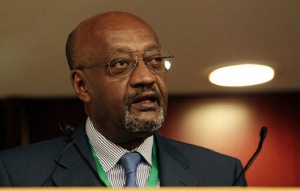 Getachew Engida, Deputy Director-General,UNESCO
Getachew Engida, Deputy Director-General,UNESCO
Crime against journalists should not go unpunished in order to guarantee their better protection. That's according to the Deputy Director-General, United Nations Education, Scientific, and Cultural Organisation (UNESCO), Getachew Engida.
He said UNESCO records showed that more than 800 journalists were killed in the last decade and nine out of 10 killings went unpunished, adding that every time a journalist was killed, UNESCO called for justice.
“Therefore, UNESCO, the implementer of the United Nations Plan of Action on the Safety of Journalists and the Issue of impunity; We believe that this plan provides a roadmap on how to improve the safety of journalists.”
Mr. Engida said this on Wednesday during the World Press Freedom Day International Conference in Accra.
“In order to guarantee better protection for journalists, UNESCO encourages the setup of national mechanisms for the safety of journalists,” he added.
He said it was only when journalists could report without fear for their lives and citizens could access information to make informed decisions, then democracy and development would thrive.
To eliminate the fear factor which leads to self-censorship and silencing of societies, Mr Engida said courts needed to protect journalists against attacks online and offline and demonstrate the power of the rule of law to turn back impunity for crimes against journalists.
The three-day global event, which is on the theme; “Keeping Power in Check: Media, Justice and The Rule of Law,” is being organised by the UNESCO in collaboration with the Government of Ghana.
It has assembled more than 700 leading actors from the media, civil society, policy makers, representatives of the judiciary, and academia to discuss latest developments and pressing challenges related to press freedom and the safety of journalists.
Participants are exploring issues including the media and the judiciary’s respective roles in ensuring the rule of law, and in times of elections safeguard the fundamental rights to freedom of expression, and addressing crimes against journalists.
There will be the award ceremony of the annual UNESCO/Guillermo Cano World Press Freedom Prize on the evening of May 2.
The Prize awards a journalist who stood his or her ground in the defence of press freedom.
Mr. Engida quoted the former UN Secretary-General and author Shashi Tharoor as saying: “Freedom of the press is the mortar that binds together the bricks of democracy and it is also the open window embedded in those bricks.
The UNESCO Deputy Director General said: “We all agree there is no democracy without free expression and there is no development without democracy”.
Dr. Mustapha Abdul-Hamid, the Minister of Information, reiterated that to further empower citizens, media and civil societies, the Government was going to provide the needed support to Parliament to pass the Right to Information Bill.
He said part of Ghana’s democratic gains were due to press freedom and freedom of speech and called on other leaders to embrace the right to free expression and press freedom.
“Open up your societies and let the people feel free in engaging in a vagarious exchange of ideas. That is how your nations would become greater and stronger than what they are today,” he said.